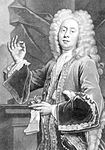Related Research Articles

The Squire of Alsatia is a 1688 comedy play by the English writer Thomas Shadwell. Alsatia was a nickname for the Whitefriars area of London, deriving from Alsace in northeastern France. A restoration comedy, it was performed at the Drury Lane Theatre by the United Company following on from John Crowne's Darius, King of Persia. One of the best-remembered roles, that of the shrewish Mrs. Termagant was first performed by Elizabeth Boutell. It was revived numerous times during the eighteenth century.
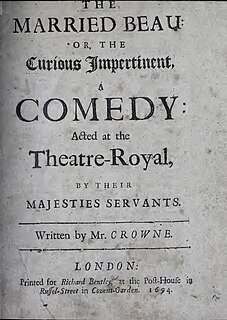
The Married Beau or The Curious Impertinent is a 1694 comedy play by the English writer John Crowne. It is inspired by a passage from Miguel de Cervantes's Don Quixote. Incidental music was composed by Henry Purcell.
The Marriage-Hater Matched is a comedy play by the English writer Thomas D'Urfey. It was first staged by the United Company at the Theatre Royal, Drury Lane in January 1692. The original cast included John Bowman as Brainless, William Mountfort as Sir Philip Freewit, Samuel Sandford as Limber, John Hodgson as Darewell, Anthony Leigh as Myn Here Van Grin, George Bright as Bias, Thomas Doggett as Solon, William Bowen as Callow, Colley Cibber as Splutter, Elizabeth Barry as Lady Subtle, Katherine Corey as Lady Bumfiddle, Anne Bracegirdle as Phoebe, Charlotte Butler as La Pupsey and Abigail Lawson as Margery.
Sir Anthony Love; Or, The Rambling Lady is a 1690 comedy play by the Irish writer Thomas Southerne. It was originally staged by the United Company at the Theatre Royal, Drury Lane with a cast that included Susanna Mountfort in a breeches role as Sir Anthony Love, William Mountfort as Valentine, Joseph Williams as Ilford, William Bowen as Sir Gentle Golding, Anthony Leigh as An Abbe, John Hodgson as Count Canaile, Samuel Sandford as Count Verole, George Bright as Waitwell, Colley Cibber as Servant to Sir Gentle, Charlotte Butler as Floriante, Anne Bracegirdle as Charlote and Frances Maria Knight as Volante. The play's incidental music was composed by Henry Purcell.

The Wives Excuse also The Wives Excuse; Or, Cuckolds Make Themselves is a 1691 comedy play by the Anglo-Irish writer Thomas Southerne. The title is sometimes written more grammatically as The Wives' Excuse.

Agnes de Castro is a 1695 tragedy by the English writer Catharine Trotter. Based on the novel of the same title by Aphra Behn, it was first staged by John Rich's company at the Theatre Royal, Drury Lane.
The Woman Captain; Or, The Usurer Turned Soldier is a 1679 comedy by the English writer Thomas Shadwell. It was originally staged by the Duke's Company at Dorset Garden Theatre in London. The original cast is unknown except for Elizabeth Barry who played the title role, and also read the epilogue. It is part of the tradition of Restoration Comedy that flourished during the era.
The Massacre of Paris is a 1689 tragedy by the English writer Nathaniel Lee. It was first staged by the United Company at the Theatre Royal, Drury Lane. It is based around the 1572 St. Bartholomew's Day massacre which led the killing of many Huguenots during the French Wars of Religion. The events had previously been portrayed in Christopher Marlowe's Elizabethan play The Massacre at Paris.

The Fortune Hunters; Or, Two Fools Well Met is 1689 comedy play by James Carlile. It was originally staged by the United Company at the Theatre Royal, Drury Lane in London.
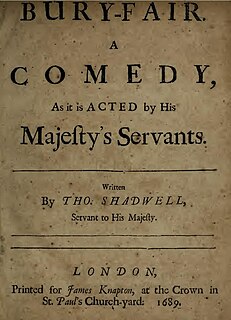
Bury Fair is a 1689 comedy play by the English writer Thomas Shadwell. It is part of the tradition of Restoration Comedy that flourished during the era. It was first staged by the United Company at the Theatre Royal, Drury Lane in London.

Love Triumphant; Or, Nature Will Prevail is a 1694 tragicomedy by the English writer John Dryden. It was Dryden's final stage play.

Sir Barnaby Whigg; Or, No Wit Like A Womans is a 1681 comedy play by the English writer Thomas D'Urfey. It was first staged by the King's Company at the Theatre Royal, Drury Lane. A song for the play was composed by Henry Purcell.

Mithridates, King of Pontus is a 1678 tragedy by the English writer Nathaniel Lee. It was first performed at the Theatre Royal, Drury Lane in London by the King's Company. John Dryden wrote the play's epilogue.
The Rambling Justice; Or, The Jealous Husbands is a 1678 comedy play by the English writer John Leanerd. It was first staged at the Theatre Royal, Drury Lane by the King's Company.

Love In The Dark; Or, The Man of Bus'ness is a 1675 comedy play by the English writer Francis Fane. It was first staged by the King's Company at the Theatre Royal, Drury Lane in London. The epilogue was written by the Earl of Rochester, and may also have contributed some of the more libertine lines to the play. It is set in Venice.

Love in a Wood; Or, St James's Park is a 1671 comedy play by the English writer William Wycherley. His debut play, it was first staged at the Theatre Royal, Drury Lane by the King's Company.

The Tragedy of Nero, Emperour of Rome is a 1674 tragedy by the English writer Nathaniel Lee. It was originally performed at the Theatre Royal, Drury Lane by the King's Company.
Constantine the Great is a 1683 tragedy by the English writer Nathaniel Lee. It is based on the reign of the Roman Emperor Constantine the Great. It was first staged by the United Company at the Theatre Royal, Drury Lane in London. The epilogue was written by John Dryden.
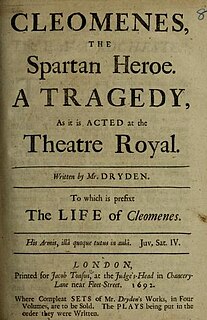
Cleomenes, the Spartan Hero or Cleomenes, The Spartan Heroe: A Tragedy is a 1692 tragedy by the English writer John Dryden. It was first staged at the Theatre Royal, Drury Lane by the United Company. It portrays the reign of Cleomenes, the King of Sparta, inspired by Plutarch's history of the period. Dryden's version is strongly Jacobite in drawing parallels from his overthrow to the recent Glorious Revolution in England. Because of this it was temporarily banned by the authority of Queen Mary.
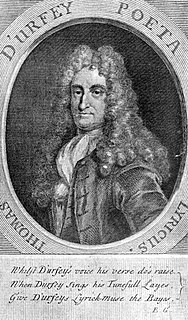
The Campaigners; Or, The Pleasant Adventures At Brussels is a 1698 comedy play by the English writer Thomas D'Urfey. It was first staged at the Theatre Royal, Drury Lane by Christopher Rich's Company.
References
- ↑ Van Lennep p.257
